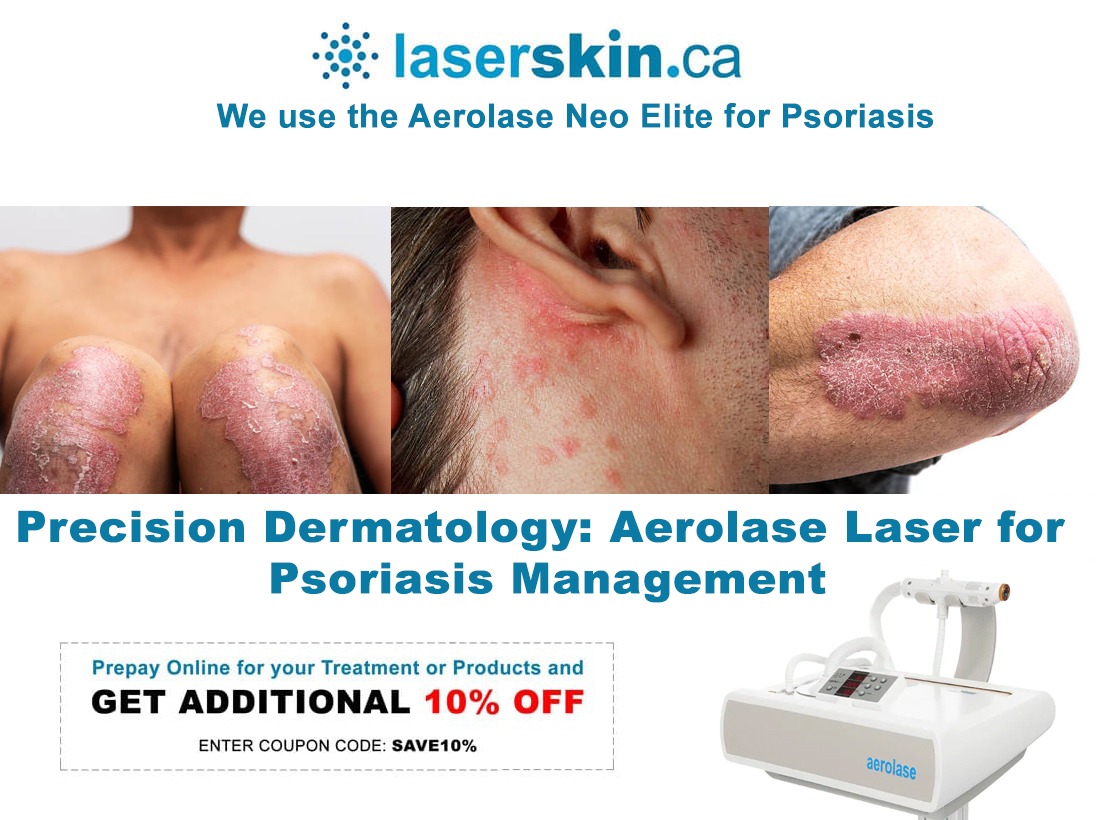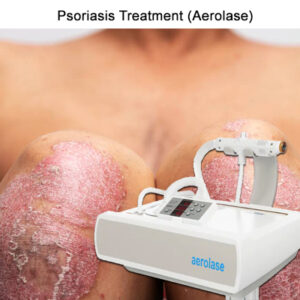
-
Quickview
Psoriasis
$450.00 – $2,025.00Price range: $450.00 through $2,025.00 Select options This product has multiple variants. The options may be chosen on the product page
Precision Dermatology: Aerolase Laser for Psoriasis Management
Psoriasis is a persistent autoimmune disorder marked by an accelerated multiplication of skin cells, often occurring at rates significantly higher than the usual pace of regeneration. This rapid growth causes red, raised, and scaly patches to appear on the skin. The impact of psoriasis goes beyond the physical symptoms, affecting individuals emotionally and socially. It can lead to self-consciousness, anxiety, and a reduced quality of life for those affected.
Aerolase, a cutting-edge laser technology, has emerged as a promising avenue in managing psoriasis. Its versatility in dermatological applications has garnered attention for its potential to address this challenging skin condition. The mechanism of action lies in its ability to emit specific wavelengths of light, penetrating the skin without causing harm to surrounding tissues. This targeted energy reduces the inflammation and excessive skin cell growth associated with psoriasis.
The precision of Aerolase in targeting psoriatic lesions is a key advantage in managing this condition. Unlike traditional treatments, Aerolase can focus specifically on affected areas without affecting healthy skin, minimizing the risk of collateral damage. This precision offers hope for individuals struggling with localized psoriasis patches.
There are various types of psoriasis, each with its unique characteristics. Aerolase, with its customizable approach, provides tailored treatments for specific psoriasis types. Whether it’s plaque, guttate, inverse, pustular, or erythrodermic psoriasis, Aerolase offers treatment plans adapted to individual needs.
Clinical evidence supports Aerolase’s efficacy in psoriasis management. Research studies consistently demonstrate significant improvements in reducing psoriatic lesions, easing inflammation, and improving overall skin appearance following Aerolase treatments. Patients undergoing Aerolase therapy often report positive experiences, expressing satisfaction with visible improvements in their skin and reduced discomfort associated with psoriasis.
Comparative analyses between Aerolase and traditional psoriasis treatments highlight the benefits of this laser technology. Aerolase demonstrates faster results, minimal discomfort during treatment, and, importantly, a more targeted approach than conventional therapies like topical creams, phototherapy, or systemic medications.
Preparing for Aerolase sessions involves understanding the treatment process and potential outcomes. Dermatologists recommend pre-session consultations to discuss expectations, assess the extent of psoriatic lesions, and establish personalized treatment plans. During Aerolase sessions, patients experience minimal discomfort, with the laser emitting controlled energy to targeted areas.
Post-treatment care plays a pivotal role in maximizing the efficacy of Aerolase for psoriasis management. Dermatologists guide aftercare routines and skincare practices to optimize recovery and maintain treatment results. Though generally safe, potential risks associated with Aerolase psoriasis treatment include temporary redness, swelling, or pigmentary changes, typically manageable and subside with time.
Long-term considerations involve regular follow-up appointments with dermatologists to monitor progress, address concerns, and adjust treatment plans if necessary. Experts stress the importance of continuous care and adherence to recommended lifestyle changes for sustained psoriasis management results.
Dermatologists emphasize the significance of choosing qualified Aerolase practitioners experienced in treating psoriasis. Their insights and expertise are crucial in achieving optimal outcomes for individuals seeking relief from psoriasis symptoms.
Looking ahead, advancements in Aerolase technology offer promising prospects for further refining psoriasis management. Continuous research and developments aim to improve treatment precision and effectiveness and expand the range of individuals benefitting from this innovative approach.
In conclusion, Aerolase laser technology represents a significant leap forward in psoriasis treatment. The precision, effectiveness, and adaptability it offers hold the potential to revolutionize the experiences of those impacted by psoriasis, presenting prospects for better symptom control and an elevated standard of living.
Q&A
How does Aerolase contribute to managing psoriasis?
Aerolase aids in managing psoriasis by emitting specific light wavelengths that target inflammation and excessive skin cell growth, reducing psoriatic lesions.
What sets Aerolase apart in treating psoriasis?
Aerolase’s precision in targeting psoriatic lesions without affecting healthy skin distinguishes it, offering a more localized and effective treatment approach.
What types of psoriasis can Aerolase treat?
Aerolase provides tailored treatments for various psoriasis types, including plaque, guttate, inverse, pustular, and erythrodermic psoriasis.
Is there evidence supporting Aerolase’s effectiveness in psoriasis treatment?
Clinical studies consistently demonstrate improvements in reducing psoriatic lesions and alleviating inflammation with Aerolase treatments.
How do patients generally respond to Aerolase therapy for psoriasis?
Patients often report positive experiences with visible improvements in their skin and reduced discomfort associated with psoriasis after Aerolase treatments.
What advantages does Aerolase offer over traditional psoriasis treatments?
Aerolase provides:
Faster results.
Minimal discomfort during treatment.
A more targeted approach compared to conventional therapies like topical creams or phototherapy.
What’s involved in preparing for Aerolase sessions for psoriasis treatment?
Before the sessions, the initial consultations assist in setting expectations, assessing lesion severity, and devising personalized treatment approaches to maximize outcomes.
What should one expect during Aerolase sessions for psoriasis?
Aerolase sessions involve minimal discomfort, with controlled energy specifically targeting psoriatic lesions without affecting surrounding healthy skin.
What post-treatment care is recommended after Aerolase therapy for psoriasis?
Dermatologists advise on aftercare routines and skincare practices to optimize recovery and maintain treatment results for psoriasis management.
What role do dermatologists play in Aerolase psoriasis treatment?
Qualified dermatologists experienced in Aerolase treatments guide patients, ensuring optimal outcomes and personalized care for effective psoriasis management.
Book Your Free Consultation Today Or Call (647) 560-9233
By providing your phone number you agree to receive informational text messages from laserskin.ca. Consent is not a condition of purchase. Message frequency will vary. Msg & data rates may apply. Reply HELP for help or STOP to cancel.

